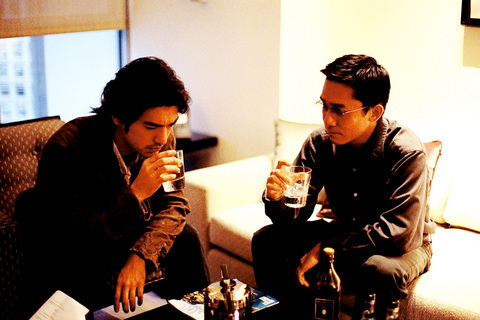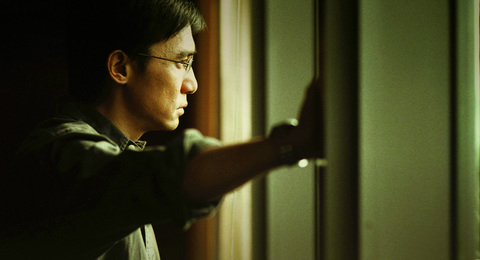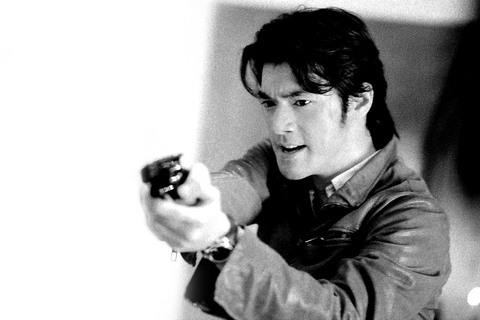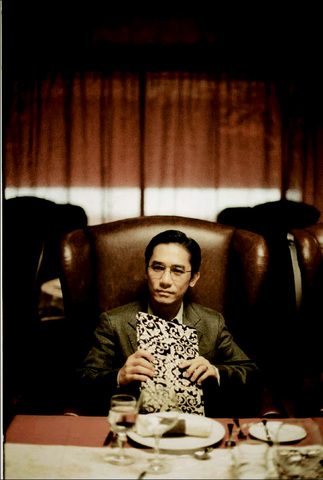Three years after the final installment of the phenomenally successful Infernal Affairs (無間道) trilogy hit the big screen, the Hong Kong director duo Andrew Lau (劉偉強) and Alan Mak (麥兆輝), armed with a production budget of NT$350 million and a stellar cast including Tony Leung (梁朝偉), Takeshi Kaneshiro (金城武) and Shu Qi (舒淇), have teamed up again for their highly anticipated police thriller Confession of Pain (傷城). The film is a sensible melodrama that examines the gray area between good and evil where heartbroken individuals seek salvation.
In Confession of Pain, Leung plays homicide squad leader named Hei, while Kaneshiro is his former agent Bong, who becomes a private detective and hits the bottle after discovering his pregnant girlfriend has committed suicide.
The gruesome murder of Hei's billionaire father-in-law prompts his new wife Susan to enlist Bong's help in cracking the case. On the surface, the murder appears to be a vendetta killing, but as Bong digs deeper into the case, he realizes the killer behind the meticulously planned crime is someone close to them all.

Technically and stylistically accomplished, the film is cinematographically sharp with moody tones that find their best expression in the opening car chase across a neon-lit damp city where the characters seem trapped in the light and shade of their virtues and dark secrets.
Audiences who were fascinated by the cold-blooded murders in the Infernal Affairs trilogy will find similar thrills in Confession of Pain as its quiet manslaughter is more chilling than the massive gun fights seen in many Hong Kong action dramas.
The film falls down on its overly plain story line that deprives viewers of elements of suspense and lacks the punch to deliver an arresting narrative.

Apart from the director duo, the film also reunites Leung and Kaneshiro on screen 12 years after Wong Kar-wai's (王家衛) Chungking Express (重慶森林). Shedding his melancholy on-screen persona in Confession of Pain, the charismatic Leung makes a believable cold-blooded and elusive murderer who is nevertheless as human as a next-door neighbor. Yet the compact 90-minute thriller fails to squeeze in enough room for a full development of this complicated principle.
Kaneshiro proves himself to be more than just an Asian stud in his portrait of the downhearted man crippled with regret, while Shu Qi is properly cast as the happy-go-lucky cutie healing Bong's wounded heart and providing some much needed comic relief. The talented actor Chapman To (杜汶澤), however, goes virtually unnoticed in his role as detective Kwong who is, at best, a lovable sidekick delivering a few humorous moments.
In the final reckoning, Confession of Pain is a stylish melodrama with all the looks to become a blockbuster but fails to fulfill the directors' promise to top the epic Infernal Affairs trilogy.



JUNE 30 to JULY 6 After being routed by the Japanese in the bloody battle of Baguashan (八卦山), Hsu Hsiang (徐驤) and a handful of surviving Hakka fighters sped toward Tainan. There, he would meet with Liu Yung-fu (劉永福), leader of the Black Flag Army who had assumed control of the resisting Republic of Formosa after its president and vice-president fled to China. Hsu, who had been fighting non-stop for over two months from Taoyuan to Changhua, was reportedly injured and exhausted. As the story goes, Liu advised that Hsu take shelter in China to recover and regroup, but Hsu steadfastly

Taiwan’s politics is mystifying to many foreign observers. Gosh, that is strange, considering just how logical and straightforward it all is. Let us take a step back and review. Thanks to the Chinese Nationalist Party (KMT) and the Taiwan People’s Party (TPP), starting this year people will once again have Christmas Day off work. In 2002, the Scrooges in the Democratic Progressive Party (DPP) said “bah, humbug” to that. The holiday is not actually Christmas, but rather Constitution Day, celebrating the enactment of the Constitution of the Republic of China (ROC) on December 25, 1947. The DPP and the then pan-blue dominated legislature

Focus Taiwan reported last week that government figures showed unemployment in Taiwan is at historic lows: “The local unemployment rate fell 0.02 percentage points from a month earlier to 3.30 percent in May, the lowest level for the month in 25 years.” Historical lows in joblessness occurred earlier this year as well. The context? Labor shortages. The National Development Council (NDC) expects that Taiwan will be short 400,000 workers by 2030, now just five years away. The depth of the labor crisis is masked by the hundreds of thousands of migrant workers which the economy absolutely depends on, and the

If you’ve lately been feeling that the “Jurassic Park” franchise has jumped an even more ancient creature — the shark — hold off any thoughts of extinction. Judging from the latest entry, there’s still life in this old dino series. Jurassic World Rebirth captures the awe and majesty of the overgrown lizards that’s been lacking for so many of the movies, which became just an endless cat-and-mouse in the dark between scared humans against T-Rexes or raptors. Jurassic World Rebirth lets in the daylight. Credit goes to screenwriter David Koepp, who penned the original Jurassic Park, and director Gareth Edwards, who knows